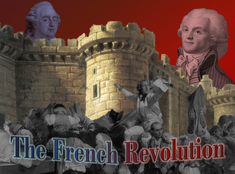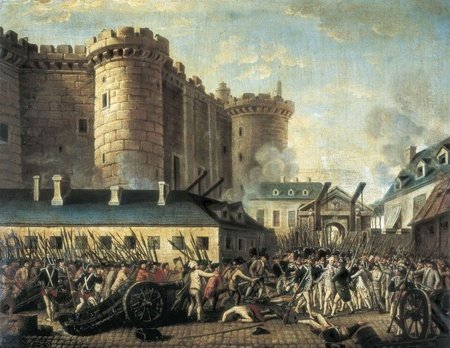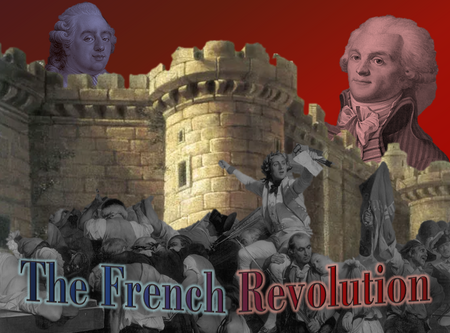
What Caused the French Revolution?
Blog by
Last updated: Sunday January 14th, 2024
Report this blog
Last updated: Sunday January 14th, 2024
Report this blog
+6
This blog shall provide an academic overview of the causes of the most famous, and important, revolution in history. It is chiefly intended for college students due to the intricate information provided and the high level of vocabulary.
For ease of learning, I have provided some hyperlinks to Encyclopedia Britannica or other relevant websites for certain specific terms.

The Storming of the Bastille on 14th July 1789: the spark of the French Revolution
Overview
On the fourteenth of July 1789, the Storming of the Bastille wrought by the people’s dissatisfaction led France down a decade of revolt and tremored the European continent. The extended suffocation of the citizens’ liberties – existing ever since the estates system and absolute regimes – had ensured their discontent. With further economic, political and social turbulence in the eighteenth century, the French people’s vexation erupted into a national revolution.
Economic Causes
Harvest failures and mismanagement of funds aggravated France’s deficit and debt, leading to heftier taxation on the Third Estate. The monarchs’ desire for involvement in wars, such as the American Revolution, caused the national debt to balloon to approximately ten billion livres by 1789, which had to be compensated for by higher taxes. The profligate economic management was also mirrored by the regressive taxation system, whereby the Third Estate was taxed 40% of its income (plus 8% due to tithes), whilst the clergy and nobility were practically exempt. Moreover, the dissolution of the central bank in 1720 meant that government spending could not be monitored efficiently. Besides the avalanche of worsening economic issues throughout the century, France’s crop failures in the winter of 1788 led to an acuminate increase in the price of bread. This rendered the cost of living unaffordable for the copious destitute families.

The environmental impact of the harsh winter of 1788, which lead to widespread crop shortages
Political Causes
The inequitable social hierarchy and absolute power withheld by the King left the lower and middle-class citizens politically underrepresented and oppressed. The estates system bitterly divided the upper-class citizens – clergymen (First Estate) and nobles (Second Estate) – from the rest of the country (Third Estate), comprising 98% of the population. Since the highest ranks were exempt from taxation, only they could afford land – which could also be acquired through venality. By earning a noble title, one could also consult the King – thus having some political representation. Due to widespread extremist piety, the Church was regarded as a divine entity and had extensive influence in the sovereign’s decisions.
Whilst only these social groups had any political influence, all power was ultimately centralised in the monarch, who had absolute control over the three branches of government: judicial, legislative and executive. Louis XVI was a weak king, as he left the governance of France to his ministers – a system marred by bureaucracy and special interests. Furthermore, as members of the Third Estate began to disapprove of the social inequality and their lack of political representation more vocally, he obstinately refused any change. Ultimately, the public outrage following Louis XVI’s dismissal of Finance Minister Jacques Necker – a constitutional monarchist and advocate for taxation reform – emblematised the need to reconstruct the rigid political system.

A representation the estates system, in which the peasants and bourgeoisie toiled whilst the nobility and clergy lived lavishly
Social Causes
Vast changes in French and Western society fostered defiance of the status quo. Since the birth of European empires, unabashed individualism and conservatism dominated ideological thinking, but the eighteenth century oversaw the flourishing of nationalism, collectivism and liberalism. John Locke’s ‘An Essay Concerning Human Understanding’ commenced the Enlightenment: a period of rigorous scientific and philosophical discourse which spotlighted liberal ideas. Philosophes such as Montesquieu, Voltaire and Jean-Jacques Rousseau pioneered ideals of human rights, a ‘social contract’ between the government and citizens, and secularism: notions which resonated with the literate bourgeoisie. Additionally, the First Industrial Revolution organised workers into large groups striving for a common task – empowering a sense of solidarity. Abroad, the success of the American Revolution in overthrowing George III as sovereign of the Thirteen Colonies encouraged Frenchmen to utilise these philosophical concepts in achieving their aims of improved political representation.

A reading of Voltaire's tragedy 'L'Orphelin de la Chine', in which numerous significant philosophes of the Enlightenment were present
Conclusion
The combination of economic, political and social trends in France throughout the eighteenth century favouring nationalism and left-wing politics, along with crop failures, administrative stubbornness and the American Revolution expedited the French Revolution. It represented the first public disapproval of the old conservative order, and an embrace of liberal ideals.
Further Reading

This blog is part of a set concerning the FRENCH REVOLUTION. The rest can be accessed from my History series, listed consecutively as the first category of blogs.
